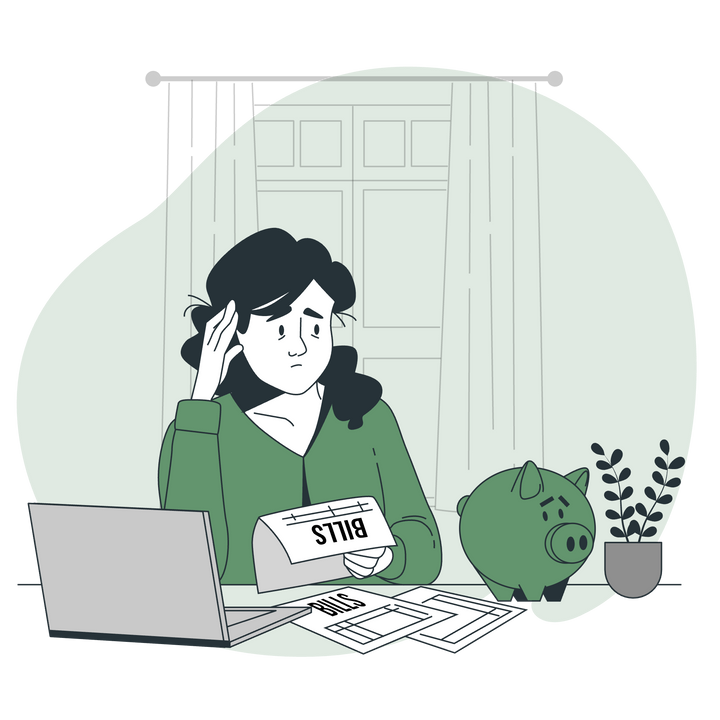Escape the Debt Spiral: How to Get Rid of Credit Card Debt
Struggling with credit card debt? Learn about various methods to tackle it, including balance transfer credit cards, consolidation loans, and debt relief options like bankruptcy or debt management plans. Explore the pros and cons of each method to find what works for you.

Disclaimer... I’m not about to Dave Ramsay this article and completely shit on credit card usage and I also don’t side with him on his stance that “responsible use of a credit card really doesn’t exist.” Hell, Pepper and I swipe and insert (don’t be nasty) our credit cards wherever and whenever we can. That being said we pay off our balance every Friday to avoid interest, but more on that later.
Nonetheless, credit cards are more of a liability than an asset for most of you out there. That’s the numbers talking, not me sitting on my high horse. To prove my point, credit card debt increased by $39.6 billion during Q3 2022 and I personally used to be a contributor to those statistics until Pepper came along and set me straight.
Which is why this topic hits close to home (ego) and I feel the need to extend some ideas on how you can start chipping away at your credit card debt. Some I even used personally. This can be a daunting topic to have to look introspectively on, but don’t worry, if I navigated these waters so can you.
The Great American Debt Trap
Credit cards – they're the convenience we all know and love, allowing us to buy just about anything with a thoughtless swipe. But as you know, nothing in life comes free and in the case of credit cards, that means paying interest on any balances you don't pay off in full each month. And let's be real, it's easy for those balances to add up fast, especially if you're using multiple cards.
So, what should you do? Well, the sooner you start paying off those balances, the better. Because if you don't, you'll be hit with a never-ending cycle of interest that will pile up faster than the laundry. If that's not bad enough, carrying a high credit card balance can seriously ding your credit score.
In fact, 30% of your credit score is based on your credit utilization, which compares your credit card debt to your total credit card limit. So, if you're looking to keep your credit score in tip-top shape, it's time to get serious about saying goodbye to credit card debt. Here are a few ways that can help.
Crush Credit Card Debt with Consolidation Loans
Pros
- Could offer lower interest rates
- Fixed repayment plans
- One monthly payment
Cons
- Fees can be high
- Potential for the rate to not be lower than current credit card payments
- Some loans penalize you for paying off your balance early
Buried under a mountain of credit card debt and feeling like you're never going to see the light of day? A credit card consolidation loan might be the shovel you’ve been looking for. This nifty little loan lets you combine all your credit card balances into one easy-to-manage personal loan.
No more juggling multiple payments and feeling like you're going to lose your mind trying to keep everything straight and in good standing. Also, with the potential for lower interest rates than credit cards, you'll be able to put more money toward paying off your actual debt.
But here’s the catch… some lenders charge fees and penalties that can seriously cut into the benefits of the loan. Longer repayment terms might sound great since they offer lower monthly payments, but it also means you'll end up paying more in interest over the life of the loan. So, choose wisely but consolidation loans could help you crush that credit card debt once and for all.
The Debt-Busting Move - Balance Transfers
Pros
- 0% APR introductory periods specifically targeting balance transfers are often offered
- Allows payments to tackle the principal rather than the interest
Cons
- Potential for high balance transfer fees
- Card usage outside of balance transfers will still be charged interest
Got a stack of credit card bills that makes the Leaning Tower of Pisa look like child's play? A balance transfer credit card could be the answer to your problems. This ingenious feature allows you to move your outstanding credit card balances to a new card, giving you the chance to pay down your debt interest-free.
Sure, there may be an initial fee, but with many cards offering a 0% APR introductory period of up to 15 or 18 months, you can save big bucks in the long run. Just make sure to read the fine print and check if the balance transfer fee is worth it.
And let's not forget, once the promotional period is over, the interest rate on the credit card will change to its normal rate, which could be higher than what you're currently paying. So make sure to pay off all your debt before that happens.
Consider a Payment Strategy
Ready to finally get rid of that pesky credit card debt? It's time to get strategic. Consider these methods to reach your goal faster and bid adieu to those looming interest rates. After all, having a solid repayment goal and strategy in place will keep you accountable.
- Pay more than the minimum payment (Self-Explanatory, don't make me waste my text count 😏)
- Debt Snowball - pay off debt by prioritizing and wiping out the smallest debt first, then rolling over that payment to the next smallest debt and gradually increasing your payments to ultimately eliminate your debt.
- Debt Avalanche - a faster and cheaper method of paying off debt where you start by paying off the debt with the highest interest rate rather than the one with the lowest balance.
Last Ditch Effort
If your monthly payments are not enough to tackle your debt, and it's getting out of hand, then consider exploring more drastic solutions such as a debt management plan or bankruptcy for relief.
Debt management plan
A debt management plan, crafted with the guidance of a nonprofit credit counseling agency, allows counselors to haggle new terms with creditors and merge credit card debt. You’ll then (typically) pay a fixed monthly fee to the counseling agency.
Bankruptcy
Bankruptcy may seem like the escape pod you've been searching for, but not so fast — filing for Chapter 7 or Chapter 13 comes with its own set of issues.

Chapter 7 wipes out your credit card debt like a napkin to spilled milk, but can harm your credit score and stay on your credit report for a number of years.
On the other hand, Chapter 13 helps you keep some of your assets by restructuring your debt into a payment plan, but it still may feel like a prison sentence lasting 3 to 5 years.
Salt’s Takeaways
Remember, getting out of credit card debt isn't easy, but it's not impossible either. Whether you opt for a balance transfer credit card or a debt management plan, the key is to keep your eye on the prize and stay committed to your goal. And if all else fails, just remember – you can always declare bankruptcy and move to a deserted island where credit cards don't exist. Cheers to a debt-free life!
FAQs
1.) How can I legally get rid of my credit card debt?
There are several legal ways to get rid of credit card debt, including paying it off, negotiating a settlement with the credit card company, or filing for bankruptcy. Paying off the debt in full is the most straightforward and least damaging to your credit score, but it may not be feasible for everyone. Settlement negotiations can result in a lower total amount owed but may have a negative impact on your credit score, while bankruptcy can provide a fresh start but has serious long-term consequences.
2.) Is credit card debt ever forgiven?
Credit card debt is typically not eligible for forgiveness, as credit card companies generally expect borrowers to repay the full amount borrowed. Failure to make timely payments can result in the debt being sent to collections, which can have serious consequences for your credit score. While there may be some limited options for negotiating a settlement with the credit card company, forgiveness is generally not a viable option for most credit card debt.
3.) How to get out of 30k credit card debt?
Getting out of 30k credit card debt can be challenging, but there are several strategies that can help, including creating a budget, reducing expenses, and increasing income. Consider using the debt avalanche or debt snowball method to prioritize payments, and explore options for negotiating a settlement or consolidating the debt. Seeking help from a financial advisor or credit counseling service can also provide guidance and support in developing a plan to become debt-free.




Comments ()